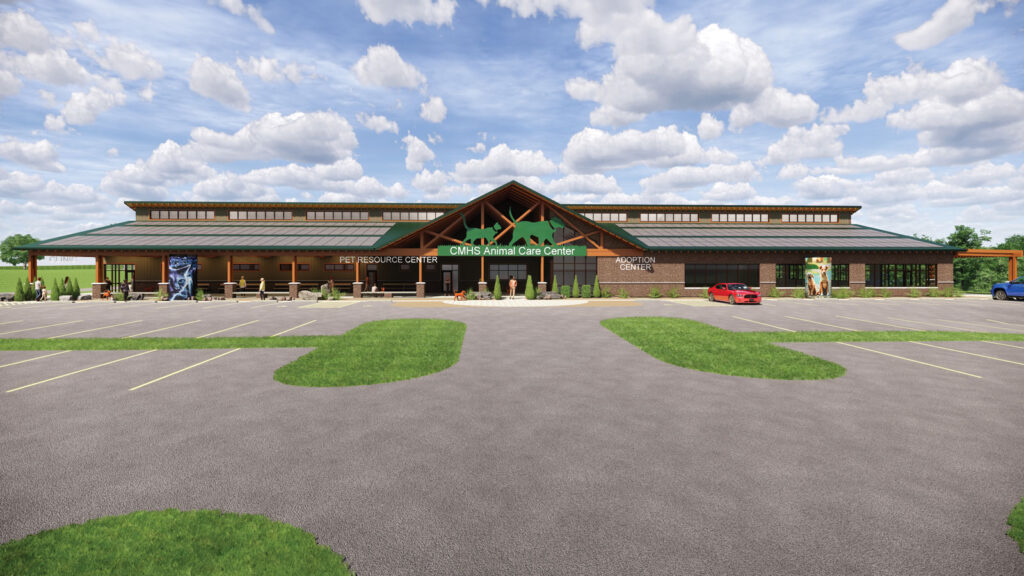The Central Missouri Humane Society is trading its dangerous doghouse for a far better home.
The Central Missouri Humane Society has been serving Columbia for eighty-one years, and forty-eight of those years have been at its present location on Big Bear Boulevard. But if the organization has its way, it won’t be there much longer.
CMHS has been quietly fundraising above and beyond its normal annual operating expenses, hoping to raise up to $10 million to build a state-of-the-art animal welfare campus. Time is of the essence. CMHS’s current facility is not only dangerously too small — especially when animals need to be segregated to avoid spreading disease — but it’s falling down around staff, volunteers, and the pets they care for.
CMHS commissioned a study to assess its current building. The study showed that renovating and expanding the existing building would cost nearly as much as building a new one. Moreover, it still would be limited by the city-owned 2.88 acres of land it sits on.
“We started the silent phase of fundraising for our campaign in March of 2020,” says Michelle Casey, CMHS associate director and campaign manager. “When the pandemic hit, we had to put the campaign on hold and shift our focus so we could continue operating through COVID-19. We are now back in our silent fundraising phase for the new building while also making sure we continue to bring in donations to support daily operations.”
CMHS has entered into a purchase agreement for 17.5 acres of land located about five minutes away from its current location. The sale is contingent upon city zoning approval. Casey is hopeful that will happen, noting that approval will be in the city’s best interests, as the city’s animal control division rents space in the shelter. CMHS provides care for the animals that are brought in.
Locating the new campus near the current facility is important. The University of Missouri College of Veterinary Medicine operates a Shelter Medicine Program. Its surgical clinic is currently in a refitted storage space across the street from CMHS but the program will eventually build a clinic at CMHS’s new location.
“We have such a symbiotic relationship with the College of Veterinary Medicine and its Shelter Medicine Program,” Casey says. “Students need surgery experience before they can graduate, so they created a program that allows veterinary students to do a rotation in Shelter Medicine and work directly with CMHS. Students assist with spay and neuter surgeries and comprehensive health exams for all our adoptable pets.”
CMHS is an open-admission shelter for Boone County, which means it doesn’t discriminate based on age, breed, health, or temperament. Besides the requisite dogs and cats, the shelter cares for a variety of other critters, including guinea pigs, turtles, rats, and mice, to name a few. The shelter is always on the lookout for people who want to adopt a pet. In fact, CMHS has an impressive 97 percent placement rate of shelter pets. But CMHS also serves the community outside its walls.
“Instead of making an effort to move pets through the shelter quickly, animal rescue organizations around the country are now focusing on creating safety-net programs to keep pets from ever entering the shelter,” Casey says. “We are proud to offer several safety-net programs including a pet food bank, low-cost veterinary clinic, and emergency program for survivors of domestic violence.”
The building project is currently in the schematic design phase. CMHS is working with Design Learned, Inc., a Connecticut firm that specializes in designing and engineering animal facilities. That’s a must because, according to Casey, a facility like an animal shelter is a horse of a different color.
While Design Learned is instrumental, CMHS is also working with local firms, including SOA Architecture, Crockett Engineering Consultants, and Coil Construction. That list will grow. CMHS is hopeful it will be able to move forward with construction documents this year.
“Local” is what CMHS has been about from the very beginning. It’s a private nonprofit organization that’s not affiliated with any national humane society organizations. Most of its funding comes from private donations.
CMHS participates in CoMoGives, processes donations at the shelter and via its website, and happily accepts cash and in-kind donations from individuals and businesses. There’s a “wish list” of needed items on the CMHS website, as well as information on other ways to donate, including planned giving, vehicle donations, employer matching gifts, and retailer donations to CMHS when you shop.
For those looking to roll up their sleeves to help four-legged members of the community, CMHS is always seeking foster homes and volunteers. Community involvement at that level is vital to the organization’s ability to carry out its work.
CMHS didn’t receive any money from the first round of Boone County’s funding from the American Rescue Plan Act but hopes to be included in the second round. Most capital grants require that applicants own the land they’re building on. Once the land purchase is completed, the organization will be able to apply for some. But mostly, CMHS is relying on the community it serves to lend a paw.
“We are always growing and evolving as an organization,” Casey says. “Our goal in the new building is to continue serving our community while making a positive impact on the homeless and unwanted pets who rely on our help.”
1943 – Residents form the Columbia Humane Society to serve the region.
1976 – The shelter moves from Creasy Springs Road to Big Bear Boulevard.
1988 – The organization builds an addition to keep up with demand.
2009 – CMHS wins national Zootoo Shelter Makeover Competition.
2020 – Silent phase of fundraising for land and new shelter begins.
2024 – CMHS entered into a purchase agreement for 17.5 acres of land.
Central Missouri Humane Society
616 Big Bear Boulevard
573-875-6155
cmhspets.org










